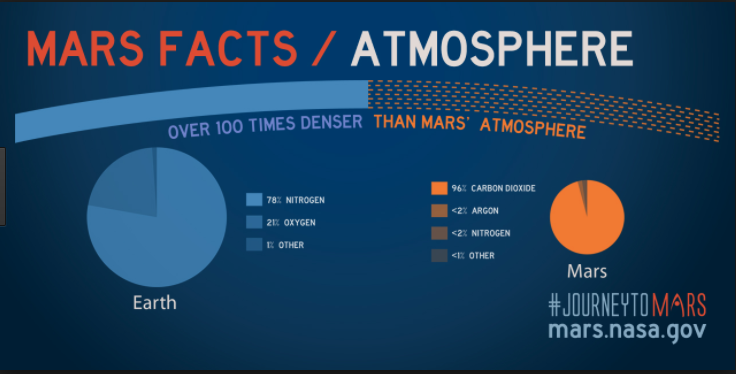Science has developed greatly over the past hundred years, however, many scientists that have been analyzing our future occupation of Mars say it's just not possible. To make Mars habitable, scientists would have to find a way to raise both the temperature and pressure. To do so they would have to add atmosphere made of heat trapping greenhouse gases, and the only one present on the planet is carbon dioxide. The carbon dioxide, however, is trapped deep beneath the surface, and frozen. Chris McKay, a leading researcher at NASA's Ames Research Center explained "If there is enough carbon dioxide, we could warm up Mars in 100 years once we start... The fundamental question is, is there enough stuff?" And as of right now, the signs point to no, there just isn't enough available for us to immediately start terraforming the planet, and we do not currently have technology advanced enough to remove the carbon dioxide from the polar ice caps and hidden reservoirs hidden deep within the planets surface.
Scientists Bruce Jakosky and Christopher Edwards have both looked deeper into the issue, and determined that Mars indeed used to have enough carbon dioxide to support life, however “The bulk has been lost to space, a small amount to polar ice and shallow carbon-bearing minerals, and an unknown amount to deep carbonates.” The majority of it was just lost in the atmosphere of space, which can not be restored, and the small remaining amount is nearly impossible to get to. Chris Edwards said "with current technology, we just don't see that there are any viable options." So this means that we will not be moving to Mars anytime soon. Not until technology advances even more, which can take hundreds of more years for all we know. But someday, generations down the line, humans might be able to call Mars their permanent home.
Scientists Bruce Jakosky and Christopher Edwards have both looked deeper into the issue, and determined that Mars indeed used to have enough carbon dioxide to support life, however “The bulk has been lost to space, a small amount to polar ice and shallow carbon-bearing minerals, and an unknown amount to deep carbonates.” The majority of it was just lost in the atmosphere of space, which can not be restored, and the small remaining amount is nearly impossible to get to. Chris Edwards said "with current technology, we just don't see that there are any viable options." So this means that we will not be moving to Mars anytime soon. Not until technology advances even more, which can take hundreds of more years for all we know. But someday, generations down the line, humans might be able to call Mars their permanent home.
Questions For Discussion
What are your thoughts on the potential move to Mars?
Do you think scientists will be able to create advanced technology allowing us to terraform Mars?
Do you think there could be possibly another planet that could support human life?
Would you rather live on Mars, or the Earth if you had the option?
Sources
I chose to write about this current event because I thought it was extremely interesting that one day we might be able to colonize another planet. Mars is a very popular science fiction topic, and there is a possibilty that this all might become real, despite all of the struggles happening with the process right now. This is a huge deal in the future of us, as well as Earth, and people should be aware that with all the changes happening on Earth, one day we will have a backup in case all else fails.

Kate,
ReplyDeleteThis is a great post! You clearly did your research and wrote a thoughtful post. However, you need to tie it into government and politics a little bit more than you do. (Don't worry that won't impact your grade this time!) For example, should the government fund research into life on Mars? Is it a good use to time for the government to worry about life on another planet instead of life on Earth? Maybe you can connect it NASA. Something to think about.